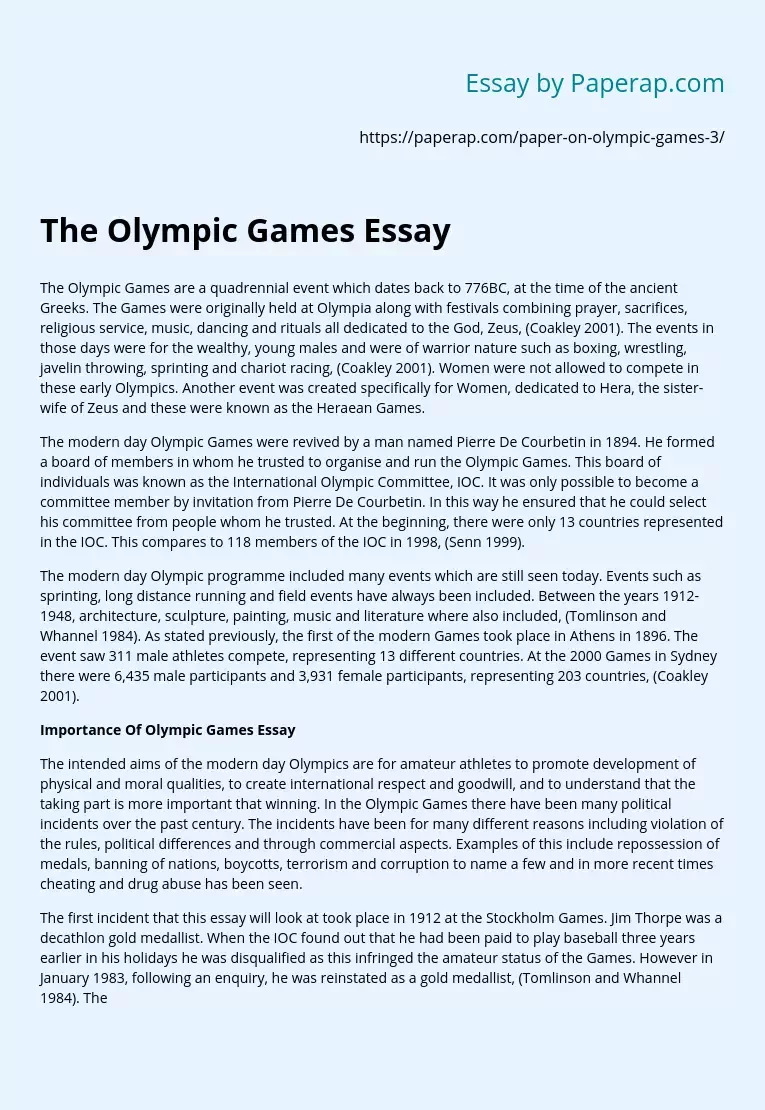The Olympic Games Essay
The Olympic Games are a quadrennial event which dates back to 776BC, at the time of the ancient Greeks. The Games were originally held at Olympia along with festivals combining prayer, sacrifices, religious service, music, dancing and rituals all dedicated to the God, Zeus, (Coakley 2001). The events in those days were for the wealthy, young males and were of warrior nature such as boxing, wrestling, javelin throwing, sprinting and chariot racing, (Coakley 2001). Women were not allowed to compete in these early Olympics.
Another event was created specifically for Women, dedicated to Hera, the sister-wife of Zeus and these were known as the Heraean Games.
The modern day Olympic Games were revived by a man named Pierre De Courbetin in 1894. He formed a board of members in whom he trusted to organise and run the Olympic Games. This board of individuals was known as the International Olympic Committee, IOC. It was only possible to become a committee member by invitation from Pierre De Courbetin.
In this way he ensured that he could select his committee from people whom he trusted. At the beginning, there were only 13 countries represented in the IOC. This compares to 118 members of the IOC in 1998, (Senn 1999).
The modern day Olympic programme included many events which are still seen today. Events such as sprinting, long distance running and field events have always been included. Between the years 1912-1948, architecture, sculpture, painting, music and literature where also included, (Tomlinson and Whannel 1984). As stated previously, the first of the modern Games took place in Athens in 1896.
The event saw 311 male athletes compete, representing 13 different countries. At the 2000 Games in Sydney there were 6,435 male participants and 3,931 female participants, representing 203 countries, (Coakley 2001).
Importance Of Olympic Games Essay
The intended aims of the modern day Olympics are for amateur athletes to promote development of physical and moral qualities, to create international respect and goodwill, and to understand that the taking part is more important that winning. In the Olympic Games there have been many political incidents over the past century. The incidents have been for many different reasons including violation of the rules, political differences and through commercial aspects. Examples of this include repossession of medals, banning of nations, boycotts, terrorism and corruption to name a few and in more recent times cheating and drug abuse has been seen.
The first incident that this essay will look at took place in 1912 at the Stockholm Games. Jim Thorpe was a decathlon gold medallist. When the IOC found out that he had been paid to play baseball three years earlier in his holidays he was disqualified as this infringed the amateur status of the Games. However in January 1983, following an enquiry, he was reinstated as a gold medallist, (Tomlinson and Whannel 1984). The 1936 Games were held in Berlin, Germany. At the Games Adolf Hitler banned all Jews from participating in the Games that year because of his anti-Jewish policy.
Also at the 1936 Games a black US sprinter, Jesse Owens upset Hitler by winning four gold medals. Hitler was outraged and subsequently repossed these medals and denied Owens of his victories. Along with this, in the opening ceremony, the United States refused to give the Nazi salute to Hitler, while both the United Kingdom and France obliged. This may have been a contributing factor for Hitler to stripe Owens of his medals out of spite.
After the 1940 Tokyo Games had been cancelled along with the 1944 Games due to World War II, London in 1948 also provided major controversy. The British Government banned Italy, Germany and Japan from competing in the Olympic Games due to their involvement in World War II. Germany had already previously been banned from competing in the 1924 Parisian Games due to their role in World War I. In 1972 at the Munich Games Palistinian terrorist broke into the Olympic Village taking the Israeli athletes hostage. Eleven of these athletes were subsequently murdered as the rescue attempt went tragically wrong, (Epsy 1981).
At the 1976 Montreal Games South Africa were banned from competing because they had banned all black athletes from participating in sport in South Africa. Another political event was the boycott of the Moscow Games in 1980. “The boycott of the Moscow Olympics is the most damaging of all the political actions that have affected the Olympics over the years,” (Segrave and Chu 1981 p104). This was so because these Games saw a massive reduction in the number of competitors of one of the ‘Super Nations’ and so the competitions did not reflect who was truly the best at the time. The American Government boycotted the Moscow Games in 1980 because the Russia had invaded Afganistan. In response to this Russia then retaliated four years later boycotting the Los Angeles Games in 1984, (Epsy 1981 and Tomlinson and Whannel 1984).
The 1996 Atlanta Games were a big political showcase for America. The Games allowed the US to show how rich, powerful and prestigious America is. The Games which were known as the Coca-Colympics because of the ‘official sponsor’ being Coca-Cola. Coincidently the head office of Coca-Cola is based in Atlanta, and Coca-Cola paid over $500m for this status, (Coakley 2001). The aspect of female participation over the years has changed. Over the past century it is clear to see that there are inequalities for female participation. This can be seen at the turn of the century where in the 1896 Games in Athens there were no female participants at all. This has still not been fully rectified to date, with only 34% of the competitors at the 1996 Atlanta Games being female. Compare this to Sydney 2000, where still only 38% of competitors were female, (Coakley 2001).
The Olympic Games Essay. (2019, Dec 05). Retrieved from https://paperap.com/paper-on-olympic-games-3/

